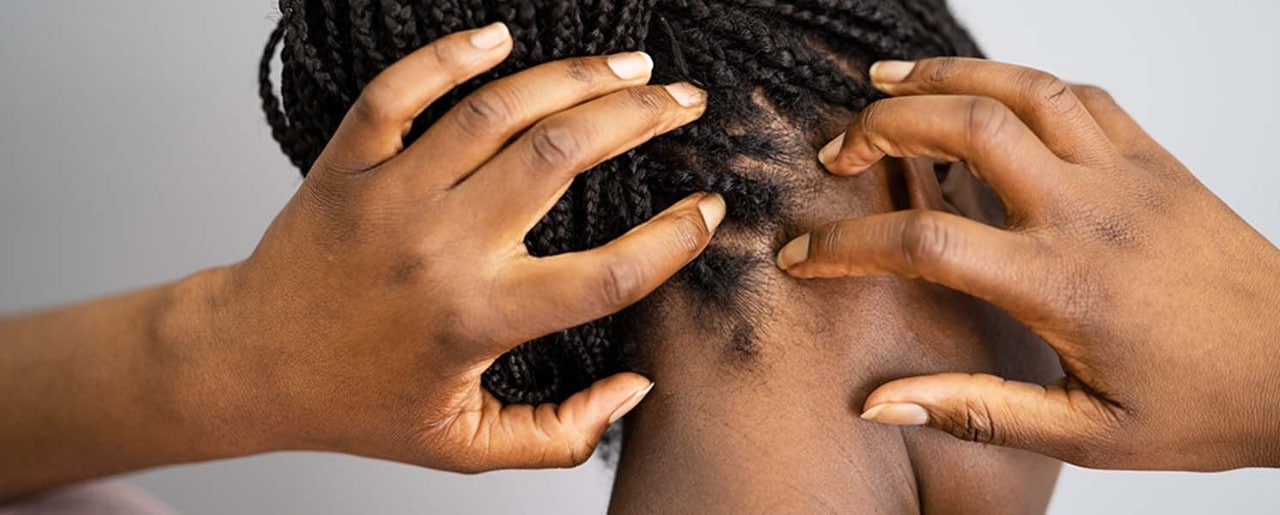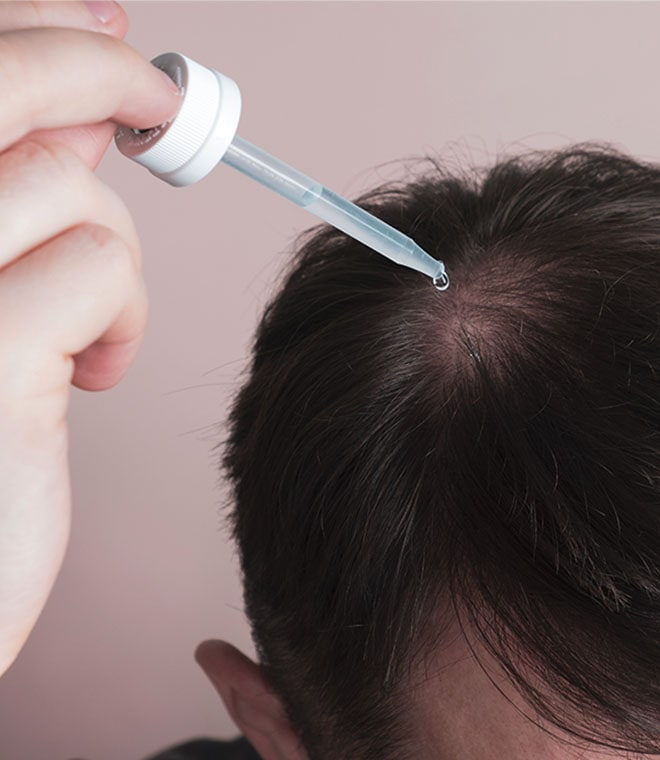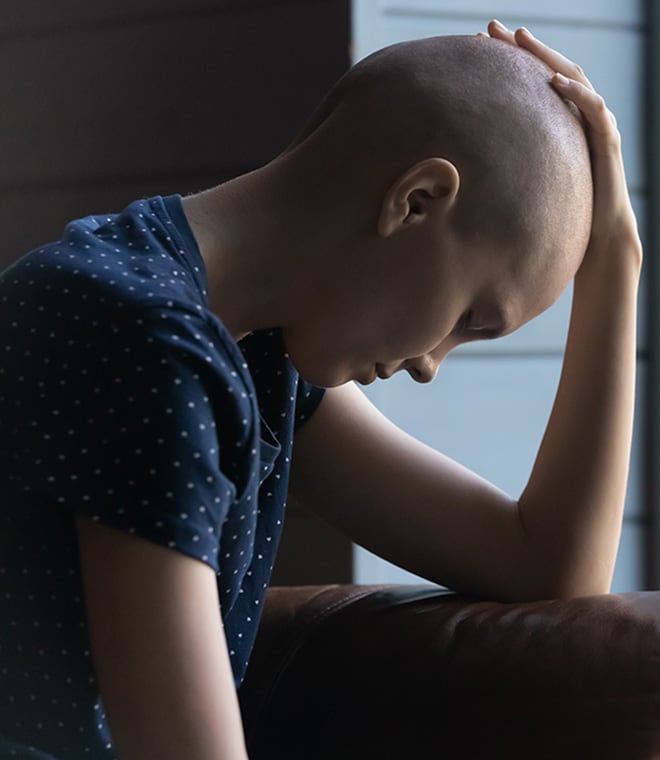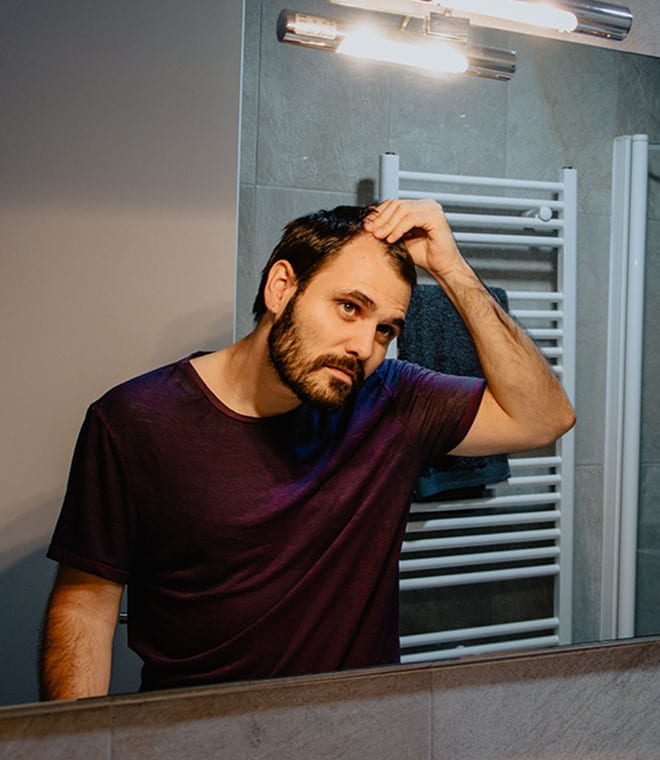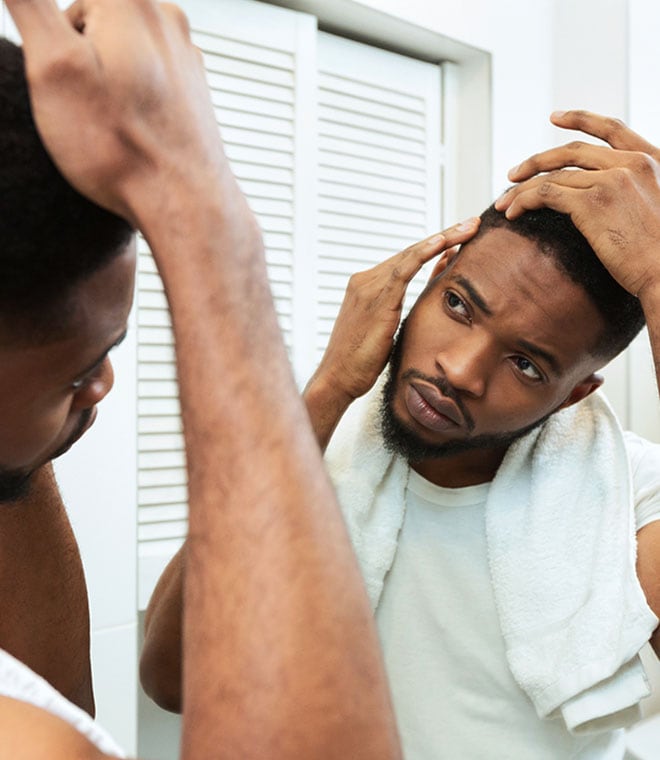Health
Dry scalp with hair loss: Is there a connection?
By Anna H. Chacon, MD, Fellow of the American Academy of Dermatology Jan 28, 2025 • 6 min
Hair loss and a dry, flaky scalp can affect your appearance and your self-esteem when they occur separately. When hair loss and itching scalp happen at the same time, the symptoms may be even more distressing. In some cases, thinning hair may be related to a flaky scalp. In other cases, they may occur at the same time for different reasons.
Can dandruff cause hair loss?
Mild dandruff caused by dry skin is unlikely to cause thinning hair or hair loss. However, thinning hair could happen secondary to chronic dandruff if you frequently pick or scratch at your scalp to relieve itching or remove flakes. Scratching your scalp too much or too vigorously can cause inflammation or even damage to hair follicles, resulting in thinning hair and hair loss. Resisting the urge to pick and scratch can lower the likelihood of hair loss.
Can dry skin cause hair loss?
Some people are predisposed to dry skin on the scalp because their bodies naturally produce less sebum, the skin's natural moisturizer. Certain medical conditions, medications and hair care products can also contribute to dry skin. Dry skin that isn't accompanied by any other symptoms is unlikely to cause thinning hair or hair loss unless there’s scalp inflammation due to scratching or picking at your skin.
Other causes of dry, itchy scalp and hair loss
Although dry skin and mild dandruff are not a common cause of thinning hair, dry scalp and hair loss can occur together. The following are some of the causes of both a dry, itchy scalp and hair loss.
Seborrheic dermatitis
Hair loss is not usually a symptom of seborrheic dermatitis, but it may happen because of scratching or picking the scalp. Also known as seborrheic eczema, seborrheic dermatitis is a chronic scalp condition that causes the following symptoms:
- Dandruff
- Greasy areas of skin with white, flaky scalp scales
- Itchy scalp
- Red scalp
- Scalp rashes
Medical experts have yet to determine precisely why some people develop seborrheic dermatitis, but the following may play a role:
- Weak immune system
- Stress
- Genetics
- Malassezia yeast overgrowth
- Certain medications
Scalp psoriasis
A chronic skin condition, scalp psoriasis occurs when the body makes new skin cells on the scalp too rapidly. This results in the following symptoms:
- Thickened reddish skin patches called plaques
- Silvery dandruff flakes
- Dry skin on the scalp
- Intense itching or burning on the scalp
- Hair loss
The exact causes of scalp psoriasis are unknown, but it seems to be linked to immune system dysfunction and is not contagious. Hair loss due to scalp psoriasis is usually reversible. Once a flare-up is under control, hair growth may resume.
Scalp ringworm
An infection caused by fungus, scalp ringworm can also lead to dry scalp and hair loss. It’s a contagious condition that spreads through close contact with someone who has a ringworm infection. It’s most common in children and adolescents because they’re more likely to share hats, combs and hair accessories.
Symptoms of scalp ringworm include:
- Scaly patches on the scalp
- Patchy hair loss
- Itching
- Pink skin
- Scalp inflammation
Hair loss due to ringworm typically stops once the infection is treated. Hair regrowth may depend on if any scarring has occurred due to the infection.
How to treat dry scalp
The cause of symptoms can help determine how to treat dry scalp.
- Dry scalp with no other symptoms: Using a mild, moisturizing shampoo, a daily conditioner and leave-in conditioner regularly may help replenish lost moisture
- Dandruff: Over-the-counter dandruff shampoos are available for the treatment of dandruff
- Seborrheic dermatitis: Over-the-counter and prescription topical medications and shampoos are the most common treatments for seborrheic dermatitis
- Scalp psoriasis: Medicated shampoos, prescription topical medications, oral prescription medications and injected medications are among the possible treatments for scalp psoriasis
- Scalp ringworm: Prescription oral medication that kills the fungus responsible for the infection is normally the treatment for ringworm
No matter what the cause of dry scalp and hair loss, following these tips can help:
- Don't scratch or pick at your scalp
- Keep your fingernails short so you are less likely to irritate your skin if you do scratch
- Use a conditioner after you shampoo to moisturize your scalp
- Avoid thermal styling tools like blow dryers, flat irons and curling irons
- Avoid chemical treatments like hair color, perms and relaxers until your symptoms resolve
It’s best not to wait for symptoms to become severe before talking to your healthcare provider about dry scalp and hair loss. If you're noticing thinning hair and have mild scalp inflammation, irritation or dryness, schedule an appointment. A thorough exam and diagnostic testing can uncover what's behind your symptoms.
Treating a dry scalp and hair loss is often simpler when you seek treatment right away. Your healthcare provider can recommend personal care, over-the-counter scalp treatments, prescription hair loss treatments and dry scalp remedies to address your symptoms.
Updated by Julie McDaniel, MSN, RN, CRNI, January 2025.
Sources:
- https://www.aad.org/public/diseases/psoriasis/treatment/genitals/scalp-hair-loss
- https://www.aad.org/public/diseases/hair-loss/treatment/tips
- https://www.aad.org/public/diseases/a-z/seborrheic-dermatitis-treatment
- https://www.health.harvard.edu/blog/thinning-hair-in-women-why-it-happens-and-what-helps-2020032719267
- https://www.mayoclinic.org/diseases-conditions/seborrheic-dermatitis/symptoms-causes/syc-20352710
- https://www.mayoclinic.org/diseases-conditions/dandruff/symptoms-causes/syc-20353850
- https://www.merckmanuals.com/professional/dermatologic-disorders/fungal-skin-infections/tinea-capitis-scalp-ringworm
- https://www.cdc.gov/ringworm/treatment/index.html
- https://www.aad.org/public/diseases/hair-loss/causes/18-causes
- https://www.psoriasis.org/scalp/
- https://www.psoriasis.org/advance/scalp-psoriasis-or-dandruff/
- https://nationaleczema.org/eczema/types-of-eczema/seborrheic-dermatitis/
- https://www.niams.nih.gov/health-topics/psoriasis
- https://www.ncbi.nlm.nih.gov/books/NBK536909/
- https://pmc.ncbi.nlm.nih.gov/articles/PMC11122068/
